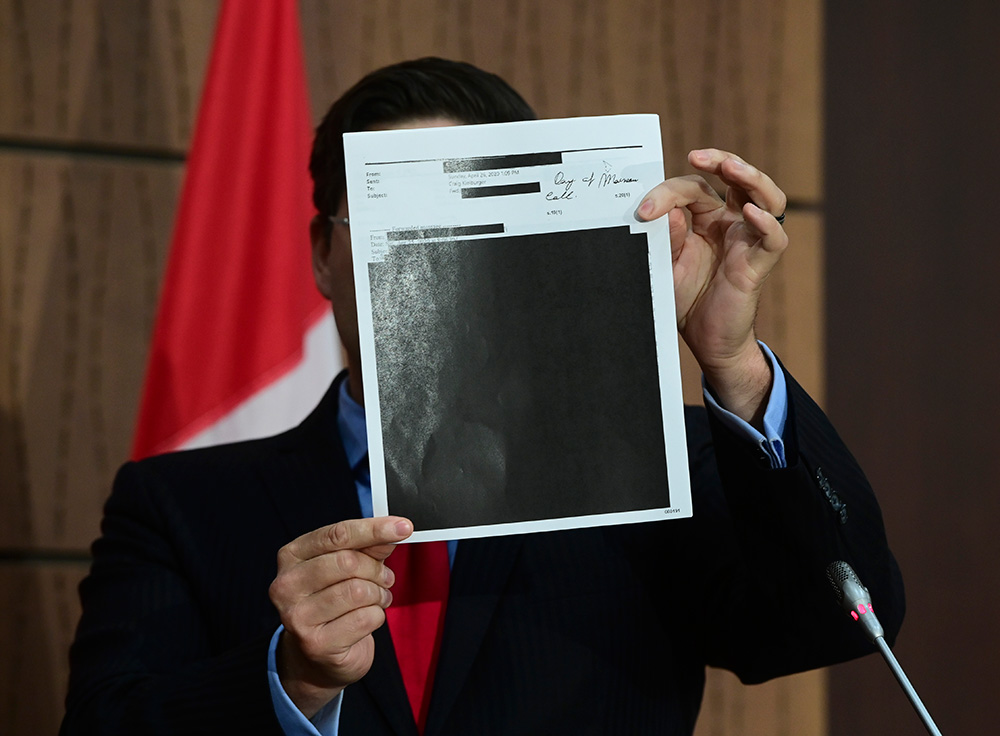Just when you thought things couldn’t get any worse for freedom of information in this country, the federal government has shown that there really isn’t a depth it will not plumb to avoid releasing government information.
Just before proroguing Parliament and shutting down the various and sundry committees looking into the WE charity scandal, the federal government made what at first would seem like a gesture toward openness — it dumped a pile of documents about the student volunteer program.
Almost as much information was blacked out as was released. What makes this particularly galling is that the federal government relied on exceptions and exemptions contained in the Access to Information Act to justify its secrecy.
Those of us who make requests using the act are very familiar with these blacked-out paragraphs or pages, each one citing one of the sections of the act that allow or sometimes require government officials to refuse to release information. These exemptions allow government to refuse to release information like legal and policy advice, commercially sensitive information and the like.
Government departments never hesitate to claim as many these exemptions as possible when responding to an access-to-information request.
But here is the problem with the government’s censorship of the WE documents.
No request was made under the Access to Information Act. A Commons committee made the request as part of a parliamentary investigation into the WE scandal.
This means that the many exemptions or exclusions the government claims have no legal validity in this instance.
A quick review of the actual provisions of the law reveals the problem — one government officials should have been immediately aware of.
Each and every one of the sections setting out the exceptions to the general requirement to release records opens with the statement that “The head of a government institution may [or in some cases shall] refuse to disclose any record requested under this Part.”
Because there was no access to information request, by definition these exemptions cannot apply.
So why would government officials try to use provisions of a law that clearly do not apply, in order to prevent release of government information?
One explanation is the government's knee-jerk reflex. The culture of governments in this country is that the information they hold is the government’s information, not the public’s, and that it should never be surrendered without a fight.
This is despite the words of the purpose section of the act, which is supposed to guide the interpretation of its provisions. Section 2 is clear. “The purpose of this Act is to enhance the accountability and transparency of federal institutions in order to promote an open and democratic society and to enable public debate on the conduct of those institutions,” it says.
The next section further clarifies the act “is also intended to complement and not replace existing procedures for access to government information and is not intended to limit in any way access to the type of government information that is normally available to the general public.”
That should also cover the right of Parliament, MPs and committees to the information.
This is not the first time the federal government has claimed the Access to Information Act allows it to refuse to release information to parliamentarians. MPs can pose formal written questions — known as Order Paper questions — for the government to answer. In recent years a number of responses have had information blacked out, with the act’s exemptions cited as the justification — even though these questions are clearly not access-to-information requests.
But it now looks like Parliament may finally be prepared to fight back.
According to media reports, Commons law clerk Philippe Dufresne wrote a letter to the clerk of the finance committee challenging these government redactions.
“The House’s and its committees’ power to order the production of records is absolute and unfettered as it constitutes a constitutional parliamentary privilege that supersedes statutory obligations, such as the exemptions found in the Access to Information Act,” he wrote.
This will be an interesting battle, if Parliament sticks to its guns.
But it seems clear that one part of the fight is over, since the Access to Information Act and the exemptions government loves to cite have no legal force in responding to a request for information from Parliament.
It is high time for our parliamentarians to deliver that message to our secretive federal government. ![]()
Read more: Rights + Justice, Federal Politics

















Tyee Commenting Guidelines
Comments that violate guidelines risk being deleted, and violations may result in a temporary or permanent user ban. Maintain the spirit of good conversation to stay in the discussion.
*Please note The Tyee is not a forum for spreading misinformation about COVID-19, denying its existence or minimizing its risk to public health.
Do:
Do not: